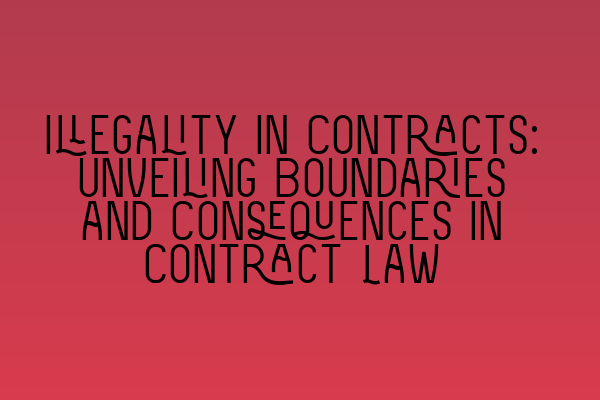Illegality in Contracts: Unveiling Boundaries and Consequences in Contract Law
Welcome to the SQE Contract Law blog, where we strive to provide valuable insights into various aspects of contract law. In this article, we will explore the intriguing world of illegality in contracts, delving into its boundaries and the potential consequences it entails. So, let’s begin our journey into this captivating topic.
Understanding Illegality in Contracts
Illegality in contracts refers to situations where the subject matter or the purpose of a contract violates the law. Simply put, if a contract is entered into for an illegal purpose or involves illegal activities, it is deemed to be illegal and unenforceable by the courts.
The boundaries of illegality can be complex, varying from jurisdiction to jurisdiction. Therefore, it is essential to consult with a qualified solicitor to navigate this intricate terrain effectively.
Different Types of Illegality
Illegality in contracts can manifest in various forms. Some common examples include:
- Illegal Acts: Contracts that involve criminal activity, such as drug trafficking or fraud, are considered illegal and unenforceable. To learn more about real-life case studies involving illegal acts and their impact on legal practice, check out our related article: Unveiling Real-Life Case Studies: Insights into Legal Practice and Decision-Making.
- Contravention of Public Policy: Contracts that contravene public policy, such as agreements to commit violence or harm public interest, are deemed illegal and will not be enforced by the courts.
- Restraint of Trade: Contracts that impose unreasonable restraints on trade, such as non-compete agreements that excessively restrict an individual’s ability to pursue their profession or trade, may be considered illegal and unenforceable.
- Unlicensed Activities: Contracts related to unlicensed activities, such as providing services without the required licenses or permits, may be deemed illegal and unenforceable.
The Consequences of Illegality
When a contract is deemed illegal, the consequences can be far-reaching and have significant implications for the parties involved. It is crucial to understand these potential consequences to safeguard your interests.
1. Unenforceability: The most immediate consequence of illegality is that the contract becomes unenforceable. This means that neither party can seek judicial enforcement or recovery of damages for breach of the contract.
2. Refusal of Courts: Courts will not assist any party seeking to enforce an illegal contract. This means that if a dispute arises, the courts will refuse to hear the case or provide any remedies to the parties involved.
3. Void Ab Initio: An illegal contract is considered void ab initio, meaning it is treated as though it never existed. The parties cannot rely on the contract to assert any rights or obligations against each other.
4. Potential Criminal Liability: Engaging in illegal activities or entering into illegal contracts can potentially lead to criminal liability. It is essential to seek legal advice promptly to protect yourself and understand your legal position.
Seek Professional Legal Advice
Given the complexities and potential consequences involved in illegality cases, it is crucial to seek professional legal advice. A qualified solicitor can assess the circumstances, provide valuable guidance, and help you navigate the legal landscape effectively.
At SQE Contract Law, we understand the intricacies of contract law and have extensive experience in handling cases related to illegality. Our team of expert solicitors is dedicated to providing top-notch legal services tailored to your specific needs.
Further Reading:
To explore more legal topics and gain insights into various aspects related to the legal profession, we recommend checking out our related articles:
- Exploring Solicitor Salaries in the UK: Average Earnings and Factors Affecting Income
- Mastering Client Relationship Management: Skills for Solicitors to Enhance Trust and Loyalty
- Pursuing a Law School Education in the UK: Choosing the Right Path for Your Future
- Securing Training Contracts: A Roadmap to Becoming a Solicitor
Thank you for joining us on this exploration of illegality in contracts. Remember, when it comes to the law, knowledge is your most powerful tool.
